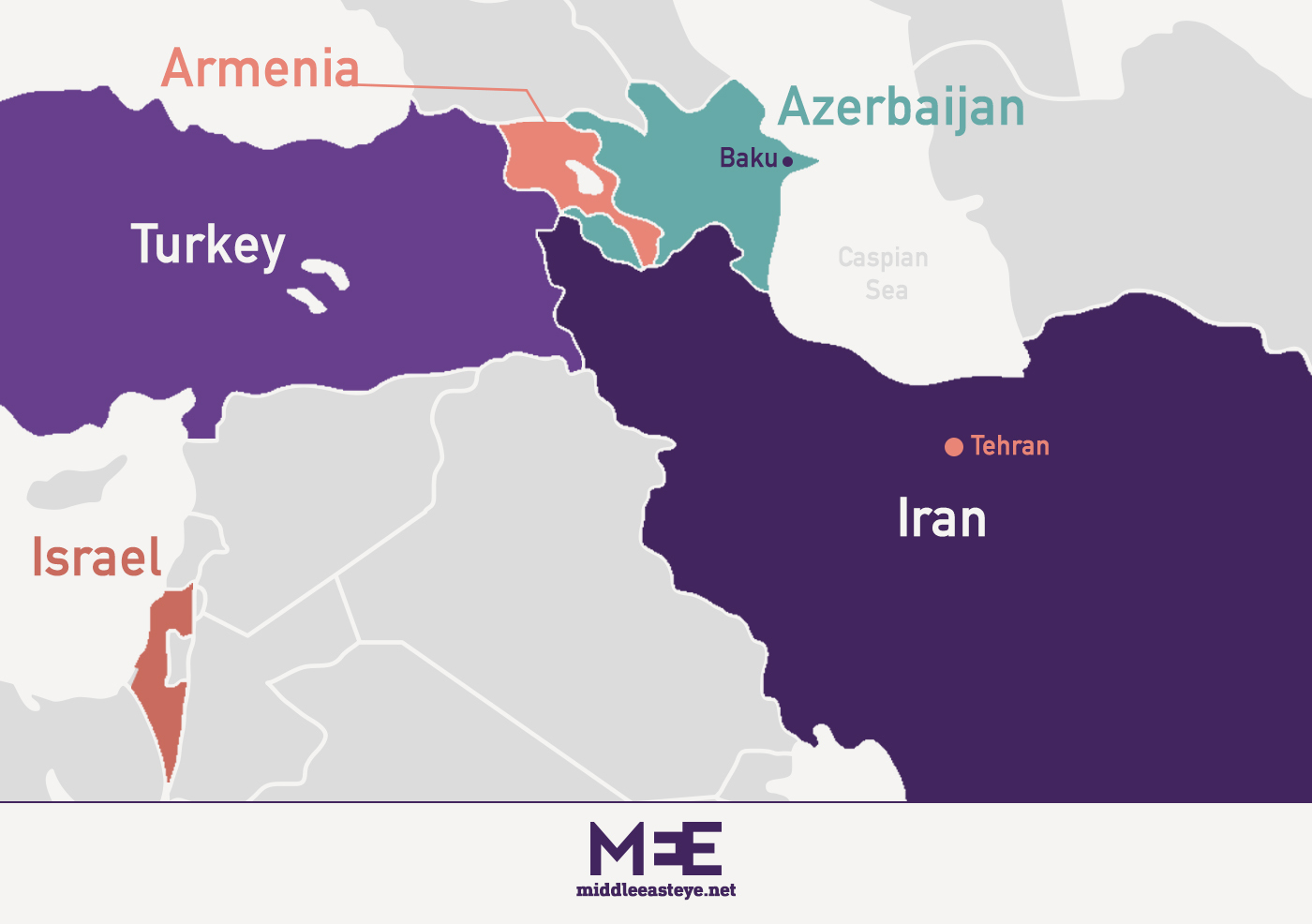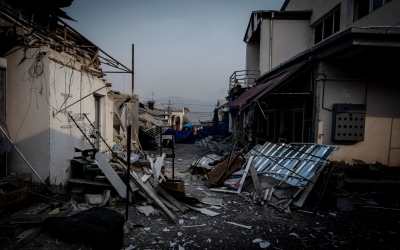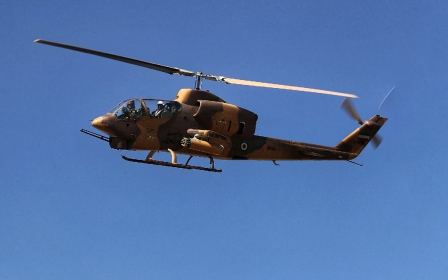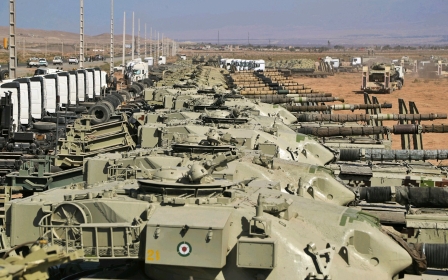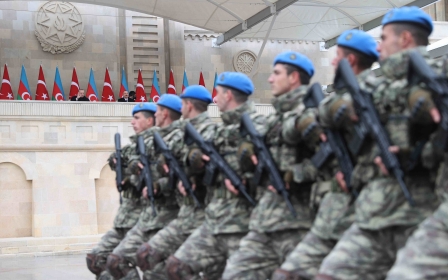Iran-Azerbaijan: What is behind the recent tensions?
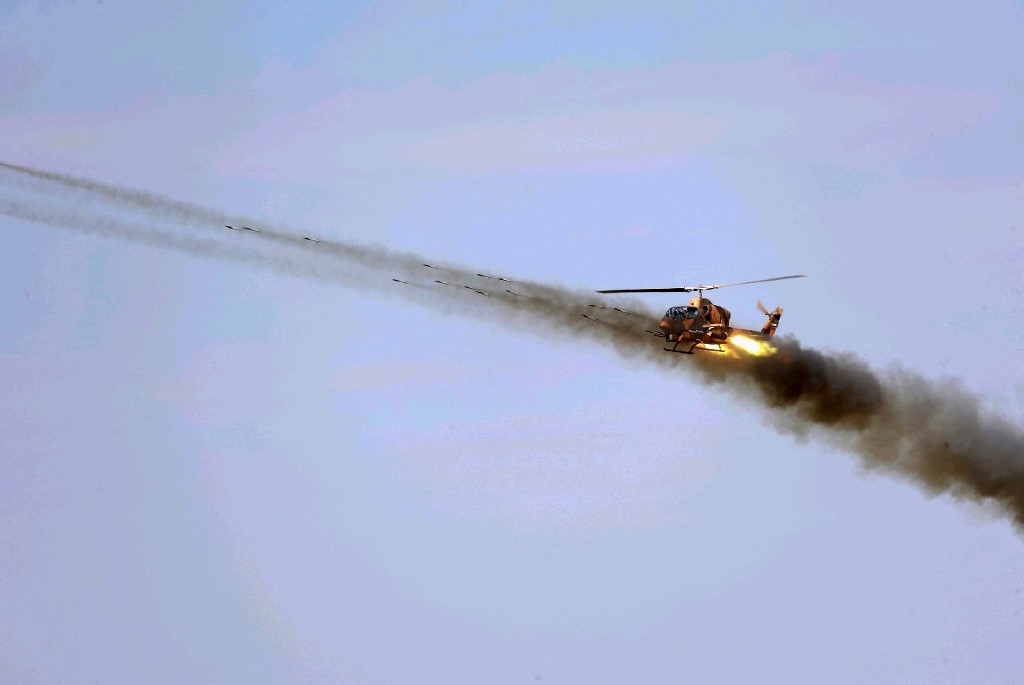
Tensions between Iran and Azerbaijan, which share a 700km border, have been ramping up in recent weeks.
Tehran has conducted large-scale army drills along its border with its Caucasus neighbour since the beginning of October just weeks after Azerbaijan and its allies Turkey and Pakistan conducted joint military drills in Baku.
The exercises took place amid claims by Iran that Israel's military is deployed on Azerbaijan soil.
In last year's war in Nagorno-Karabakh, Azerbaijan deployed Israeli "Kamikaze" drones on the battlefield, while Turkey provided arms and technical assistance to Baku, which contributed to the country's military victory over Armenia.
While current tensions between Azerbaijan and Iran have so far been confined to a war of words and military exercises along their borders, there are fears this could escalate into an all-out conflict.
New MEE newsletter: Jerusalem Dispatch
Sign up to get the latest insights and analysis on Israel-Palestine, alongside Turkey Unpacked and other MEE newsletters
The north of Iran, on Azerbaijan's southern border, hosts a sizeable Azeri population, considered the largest minority in Iran, meaning an escalation could have disastrous consequences.
Middle East Eye breaks down the causes of the recent spat.
Why does Nagorno-Karabakh matter?
Much of the trouble between Iran and Azerbaijan is rooted in last year's war in Nagorno-Karabakh between Azerbaijan and Armenia.
Nagorno-Karabakh is a disputed mountainous area in Azerbaijan that had been held by Armenian forces for nearly three decades prior to the 2020 war.
In the 1990s, the region broke away from Azerbaijan, but has yet to be recognised by any country in the world.
Separatist Armenians supported by the Yerevan government have long sought to split from Azerbaijan and become part of Armenia, though unsuccessfully.
What happened after the war over Nagorno-Karabakh?
Following the 44-day war last year, which ended after a Russian-brokered ceasefire, Azerbaijan said it had retaken much of the land in and around Nagorno-Karabakh that it had lost in a 1991-94 war that killed an estimated 30,000 people.
Iran, which borders both countries, remained largely silent throughout the hostilities, but acknowledged towards the end that the disputed region was Azerbaijani territory, despite traditionally being an ally to Armenia.
On 12 September, Azerbaijan hosted joint military exercises with Turkey and Pakistan in a move that seemingly provoked Tehran further.
Dubbed "Three Brothers 2021," the trilateral drill, according to Iran's foreign ministry, violated the provisions of the Convention on the Legal Status of the Caspian Sea, which stipulates that armed forces not belonging to Azerbaijan, Iran, Kazakhstan, the Russian Federation, and Turkmenistan are banned from a presence in the Caspian Sea. But the accord has not come into effect because Iran has yet to ratify it.
The stated goal of the drills was to strengthen existing bilateral ties and bolster counterterrorism cooperation.
At the opening ceremony of the drills, Lieutenant-General Hikmat Mirzayev, commander of Azerbaijan's special forces, acknowledged the support of Turkey and Pakistan to Azerbaijan in its 44-day war against Armenia.
How has this affected regional trade and security?
A few days after the drills started, reports emerged that Azerbaijan was imposing restrictions on Iranian trucks using a road, previously connecting Armenia and Iran, that was seized by Azerbaijan following the 2020 war.
Iran had previously used the route to reach Russia and West Asia without restrictions. The new restrictions included checkpoints and road tax for Iranian drivers, and the detention of two drivers, which apparently contradicted the provisions of the Russian-brokered ceasefire agreement that safeguarded the free flow of traffic in the area.
Azerbaijani President Ilham Aliyev brought up the issue in a recent interview with the Turkish Anadolu news agency, claiming that Iranian trucks had been "illegally" entering Karabakh since prior to the 2020 war.
He said that about 60 Iranian trucks entered Azerbaijan's Karabakh region without permits between 11 August and 11 September and that the new controls were a response to that breach.
"Then we started to control the road passing through Azerbaijani land, and the trucks sent by Iran to Karabakh came to an end," he said, adding that they should pay taxes when entering Azerbaijani territory.
Meanwhile, Iranian media claimed that Armenia intends to concede the strategic Syunik province to Azerbaijan.
Syunik, the southernmost province of Armenia, is located between Azerbaijan's Nakhchivan Autonomous Republic exclave to the west, Azerbaijan to the east, and Iran to the south. It constitutes the Armenian border with Iran.
While the 2020 truce agreement guaranteed Azerbaijan a corridor connecting Nakhchivan to the rest of Azerbaijan via Syunik, Baku is "not satisfied with this plan," says Iranian researcher Fardin Eftekhari.
'If Turkey decides to push its long-held ambition of creating a direct link to the republic of Azerbaijan by eliminating Iran's access to Armenia, then the risk of escalation will increase'
- Shireen Hunter, Georgetown University
Baku, Iranian researcher Fardin Eftekhari argues, "maintains an ambitious goal to take all of Syunik province, which could put Iran in a disadvantageous geopolitical position".
"Tehran would lose its connection to Armenia and convenient access to the region, while being compelled to deal with a newly emboldened regional power that is heavily backed by Iran's arch-enemy, Israel," Eftekhari adds.
On the other hand, Turkey, which does not share a border with Azerbaijan, has long sought to create a direct link to Azerbaijan by eliminating Iran's access to Armenia, said Iranian-American scholar and former diplomat Shireen Hunter.
"Turkey has long wanted to have a land route to Azerbaijan and from there to northern Iran and Central Asia," Hunter told MEE.
"If Turkey decides to push its long-held ambition of creating a direct link to the republic of Azerbaijan by eliminating Iran's access to Armenia, then the risk of escalation will increase," she said.
What is Israel's relationship with Azerbaijan?
Israel, Iran's regional archenemy, was one of the main backers of Azerbaijan in the Nagorno-Karabakh conflict. It is also Baku's second-largest supplier of weapons after Russia. According to the Stockholm International Peace Research Institute, Israel has been the top supplier of arms to Azerbaijan over the past few years, with an estimated $825m in sales of weapons between 2006 and 2019.
On 6 October, Iran's top diplomat expressed "serious concerns" about Israel's alleged presence in the Caucasus.
"We certainly will not tolerate geopolitical change and map change in the Caucasus," Iranian Foreign Minister Hossein Amir-Abdollahian told reporters in Moscow.
"We have serious concerns about the presence of terrorists and Zionists in this region."
Baku, however, has denied the claims of Israeli military presence near Iranian borders as "baseless".
Following the trilateral drills, Iran has held its own military exercises near the Poldasht and Jolfa border crossings with Azerbaijan. The exercises included armoured and artillery units, as well as drones and helicopters.
Azerbaijan's Aliyev voiced surprise at the Iranian drills.
"This is a very surprising event. Every country can carry out any military drill on its own territory. It's their sovereign right. But why now, and why on our border?" the president told Anadolu news agency.
"Why weren't the drills held when the Armenians were in the Jabrayil, Fizuli, and Zangilan regions? Why is this being done after we liberated these lands, after 30 years of occupation?"
Aliyev also said on 5 October that Baku "will not leave unanswered" Tehran's "baseless" allegations of an Israeli military presence on Azerbaijani soil.
Meanwhile, Amir-Abdollahian defended his country's right to hold military exercises within its territory.
According to Iranian state media, the foreign minister told the new Azeri ambassador: "Iran does not tolerate the Zionist regime's activity against its national security and will take whatever action is necessary," in reference to alleged Israeli presence on Iranian borders.
Where does this leave the Azeri minority in Iran?
Tehran may also be wary of the impact of Azerbaijan's victories and regional alliances on the Azeri population in northern Iran.
The area is inhabited by a significant Azeri population, estimated to be the largest minority in the country.
The Azeris in northern Iran held public celebrations following Azerbaijan’s victory in the Nagorno-Karabakh conflict and demanded the closure of Iranian-Armenian borders following the war.
"Iran is certainly concerned about Baku's ambitions towards its territory and the Pan-Turkist propaganda emanating from Baku and even from Turkey," said Hunter. "However, currently, there is no real threat of separatism in the Iranian Azerbaijan.
"But the landscape could change if the crisis escalates and external powers become involved," she added. "[Israeli Prime Minister] Naftali Bennett's suggestion that Iran should be killed 'by a thousand cuts' may mean eventual dismemberment of Iran."
This article is available in French on Middle East Eye French edition.
Middle East Eye delivers independent and unrivalled coverage and analysis of the Middle East, North Africa and beyond. To learn more about republishing this content and the associated fees, please fill out this form. More about MEE can be found here.


